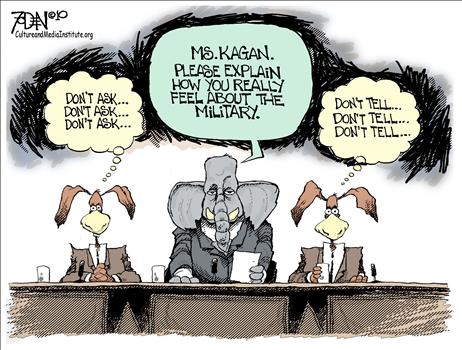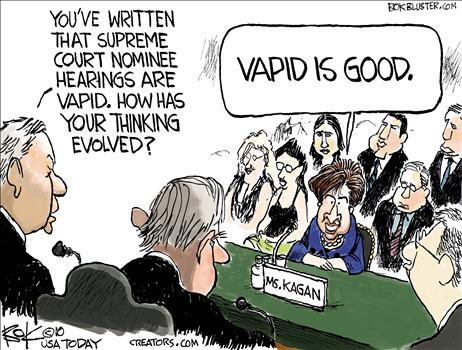I don’t watch Supreme Court confirmation hearings. I have much better things to do than see a preordained script followed. What’s taking place in the Kagan hearings right now is nothing but a show for the cameras. You won’t hear the nominee say anything of substance.
Then again, that’s really not necessary in her case. We may play a game about not knowing what she believes, but everyone really does know already. The key is for her not to tell.
The really sad part is that even if she were to tell all, she would still be confirmed. If she said the Constitution should be trampled and torn into shreds, she would be confirmed. It’s simply a matter of math—too many Democrats who will vote for her no matter what.
Hearings should get to the bottom of a nominee’s judicial philosophy. The nominee should be required to respond to specific questions about how he or she would determine constitutionality in various cases. Nominees should say why they agree or disagree with decisions the Court has made in the past. The funny thing is that Elena Kagan once wrote that those were what the hearings should be like. Apparently, she doesn’t agree with herself anymore.
There should be one overriding qualification: does the nominee believe that the Constitution, as originally understood, is the law of the land. If someone should argue that no one can know how it was originally understood, that’s an invalid argument. We have the Federalist Papers, we have the notes from the Constitutional Convention, and we have other commentaries from that period, particularly the one written by Supreme Court Justice Joseph Story. Original intent is not a mystery.
Of course, we shouldn’t even be so concerned about who sits on the Supreme Court. If it were to stay within constitutional limitations, it wouldn’t be deciding the future of the country on a series of 5-4 votes anyway. Alexander Hamilton declared that the federal courts would be the weakest of the three branches. The ascendancy of the philosophy of the “living Constitution” changed that—and not for the better.
Federalism. Does anyone remember that? It’s when we have three co-equal and balancing branches of the government, each keeping a check on the others. It would be nice to get back to that basic understanding once again.


